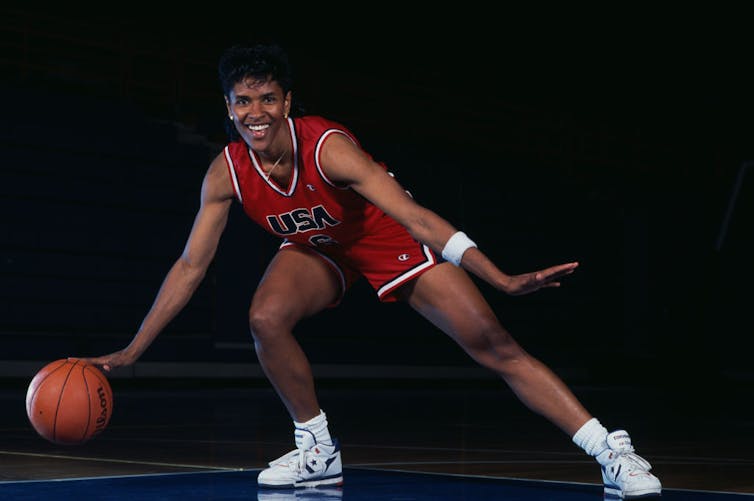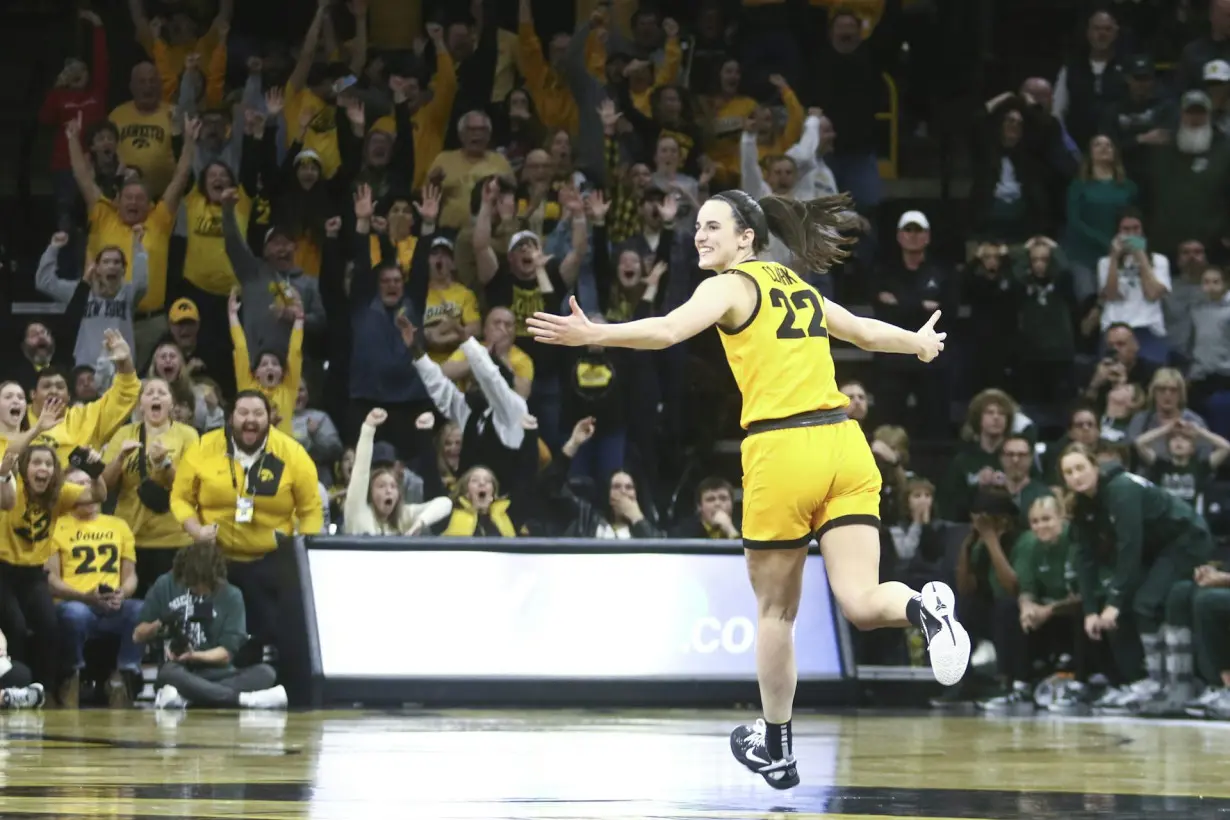When University of Iowa women’s basketball star Caitlin Clark drained a 3-pointer against the University of Michigan on Feb. 15, 2024, she secured the NCAA women’s scoring record.
Announcers noted that Clark had surpassed Kelsey Plum’s 3,527 points. But few added that there was still one more Division I women’s scoring title remaining.
That one belonged to guard Lynette Woodard, who scored 3,649 points while playing for the University of Kansas from 1978 to 1981. Her record was set before the NCAA offered women’s championships, when the Association for Intercollegiate Athletics for Women, or AIAW, was in charge.
When Clark surpassed Woodard’s AIAW milestone on Feb. 28, 2024, in the fourth quarter of a game against the University of Minnesota, it opened up another chance to revisit this buried piece of sport history.
The AIAW launched in 1972. Within a decade it was bigger than the NCAA, with nearly 1,000 member colleges and universities. It sponsored 19 sports in three divisions, was the sole organization for women’s intercollegiate athletics and the only one led by women. And the NCAA destroyed it through what SUNY Cortland sports management professor Lindsey Darvin described as a “hostile takeover.”
As a scholar of sport, gender and American culture, I study the AIAW as a key moment in sports history that has been buried, and I’m currently writing a book exploring its philosophy, impact and legacy.
In any history of women’s sports in the U.S., you’ll hear a lot about Title IX, the federal law dictating that female college athletes must receive equal opportunities in sports.
But you’ll rarely hear about the AIAW, a sporting body led by women that fundamentally changed intercollegiate sports. Its student-centered governance model continues to resonate as college athletes chip away at the power of the NCAA, whether it’s through the transfer portal or name, image and likeness deals.
Designed for women, by women
Throughout the early part of the 20th century, female college students participated in physical education classes focused on health and wellness. There were few opportunities for organized team sports.
By the 1960s, however, women students demanded school-sponsored intercollegiate teams and championships like the men had.
Women professors of physical education agreed.. But they had watched the NCAA commercial model of sport descend into exploitation and scandal under what historians have called the “cynical fiction” of amateurism. As the NCAA remained exclusively male, there was an opportunity to create something different for women’s athletics.
The AIAW emerged from that momentum – an intercollegiate athletic governance organization designed for and by women, dedicated to creating high-level competition while maintaining focus on the well-being and education of student-athletes.
Under the AIAW, all teams and athletes were supported equally, not singled out for their ability to generate revenue. They had a right to due process, an appeals system and student representatives on local and national committees. The organization ran on dues from member schools and eventually some advertising and media contracts.
Women’s athletic programs were led by physical educators turned coaches and administrators. Some of the most famous coaches in women’s basketball got their start under the AIAW, including C. Vivian Stringer, Pat Summit and Tara VanDerveer, who recently broke the all-time record for college basketball wins..
In addition to Woodard, other notable AIAW players include Ann Meyers-Drysdale, Nancy Lieberman and Lusia Harris, who was recently the subject of an Oscar-winning documentary.

Title IX backlash
There is no doubt that Title IX, which was signed into law in 1972, had a big influence on the growth of women’s college sports, mandating that educational activities, including athletics, should be the same for men and women.
Congress passed Title IX just before the AIAW’s first championship season, and the law spurred calls for more equitable resources for women’s sports.
There was immediate backlash from male-dominated sporting organizations, including the NCAA, which saw the addition of women’s sports as a loss for men’s sports. Walter Byers, then the NCAA’s executive director, said, “The possible doom of college sports is near.” One college football official told reporter Sally Jenkins that women’s sports advocates were trying “to tear the shirts off our backs.”
Despite the fearmongering, college sports continued to thrive. Nonetheless, over the past 50 years, even though nearly all schools have been out of athletic compliance with Title IX, none has lost federal funding for violations. As Title IX scholar Sarah Fields has written, “Without punitive damages, the law is limited: it is toothless.”
All along, change has come not from the law’s mere existence but from students filing complaints and lawsuits, and the determination of administrators to use the law to carve out and protect athletic opportunities for women. During the 1970s, those administrators were almost all in the AIAW.
The NCAA elbows its way in
By the late 1970s, the U.S. Department of Health, Education, and Welfare had laid out clearer standards for athletic compliance with Title IX.
While the NCAA and AIAW were not subject to the law, their member institutions were, and the two organizations’ efforts to collaborate failed. Instead, the NCAA, which had long fought Title IX’s application in athletics, changed course and set its sights on taking control of women’s sports.
The NCAA offered women’s championships in all three divisions for the first time during the 1981-82 school year. Leveraging all of its presumed legitimacy and financial resources, the 75-year-old men’s athletic organization offered all-expenses-paid women’s championships on the same weekends as the unpaid AIAW championships.
The strategy worked. The AIAW lost significant members and ceased operations in mid-1982, despite the fact that women athletes, coaches and administrators preferred its educational model and leadership structure.
The NCAA made vague promises to support women’s athletics but refused to give women more than token representation on its governance boards. Women student-athletes were, for the first time, led by a male-dominated governance organization.
To this day, institutional sexism remains entrenched in the NCAA.
Women hold only 41.3% of head coaching positions for women’s teams and 23.9% of athletic director positions – roles that were largely held by women under the AIAW. A recent gender equity review found that the organization under-resourced nearly all of its women’s championships, a result of gender bias and its focus on making money.
The NCAA and its corporate partners would like you to believe that their organization is the be-all and end-all of college sports.
But the story of the AIAW – created by and for women, rejecting the crass commercialism of the NCAA and empowering student-athletes to speak up – offers ideas for a more equitable future for college sports.

Diane Williams does not work for, consult, own shares in or receive funding from any company or organization that would benefit from this article, and has disclosed no relevant affiliations beyond their academic appointment.
Source: The Conversation



 University of Iowa guard Caitlin Clark celebrates after making the game-winning shot against Michigan State on Jan. 2, 2024.
University of Iowa guard Caitlin Clark celebrates after making the game-winning shot against Michigan State on Jan. 2, 2024.